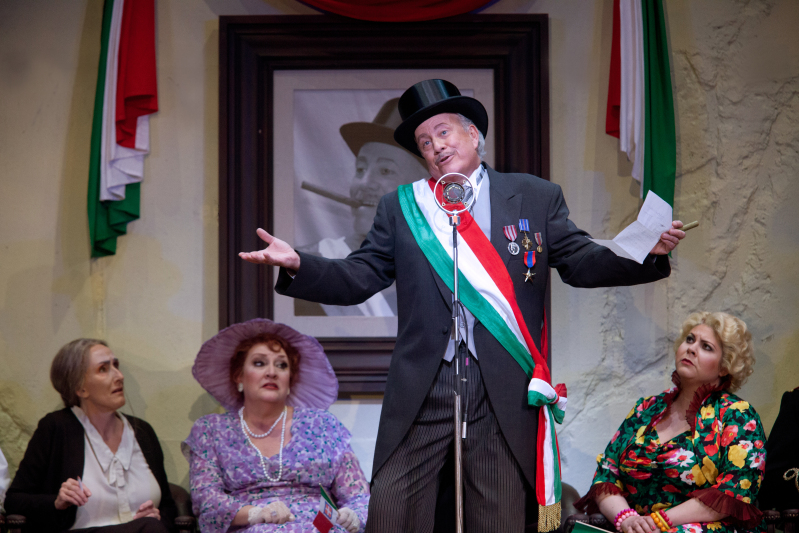Boston Lyric Opera closes season successfully with comical “Inspector”

Jake Gardiner (center) is the Mayor in John Musto's The Inspector," presented by Boston Lyric Opera. Photo: Erik Jacobs
Boston Lyric Opera is closing its season with John Musto’s The Inspector, a comic opera based on Nikolai Gogol’s satire The Government Inspector.
This is not the first time Gogol’s play has been adapted as an opera, yet Musto’s The Inspector, with a libretto by Mark Campbell, is the newest, having premiered in 2011 at Wolf Trap Opera. As such, The Inspector has the challenge of both mining the surrealistic satire of Gogol’s original, and presenting it with contemporary intelligence and humor. Friday’s opening performance at the Shubert Theatre was successful on both counts, delivering a deeply engaging yet vibrant performance.
Unlike Gogol’s original, Musto’s version is set in 1930s Italy, in a small, backwater town called Santa Schifezza. Its mayor, a man whose enormous ego is only equaled by his corruption, learns that an inspector from the new regime in Rome (in other words, Mussolini’s Fascist party) will be visiting Santa Schifezza in order to investigate corruption, bribery, etc.—practices that have been enthusiastically cultivated by the mayor himself. Meanwhile, two men, Cosimo and Tancredi, political refugees from Rome, are spotted in the town inn. The Mayor and his power-hungry wife Sarelda jump to conclusions, assume these two men are the Inspector and his servant, and proceed, with their encouragement, to wine, dine, and bribe them.
Though The Inspector lacks the melodic richness characteristic of Italian opera, Musto employs one central melody in a manner reminiscent of Broadway musicals. Part of this is satire: the same melody is sung by Beatrice, the Mayor’s young and idealistic daughter, and the Mayor’s henchmen.
In general, The Inspector is stronger, musically and dramatically, in its comic rather than heartfelt moments. For example, the music in which Beatrice expresses her desire to escape her parents’ corrupt world seems incongruous, the result of a jarring switch of gears. On the other hand, the first act solo for Sarelda, in which she conjures visions of shoes, hats, and gowns, is suave, hilarious, and convincing. Musto’s ensemble writing, which is patterned after the accumulating asides of Italian opera buffa, is uniformly excellent as well.
Boston Lyric has cast The Inspector with near perfection. Victoria Livengood as Seralda is a clear standout, with clarion top notes and a thrilling contralto. Meredith Hansen brings a youthful naiviete—and unexpected spunk—to the role of Beatrice, and sings with a beautifully controlled soprano.
Jake Gardner is a truly oily Mayor, and his baritone is both forward and incisive. However, he never sounds truly terrified at the prospect of the inspector’s arrival, thereby undermining his characterization—and the momentum—in the first part of the work. David Kravitz and Neal Ferreira, as Cosimo and Tancredi, respectively, are sung with verve and portrayed in gusto. In particular, Kravitz possesses a warm and powerful baritone.
There is no weak link in the supporting roles, and David Angus conducts with excellent comic timing. The set design, too, is a delight, featuring a rotating stage that somehow fits the waltzing undertones of Musto’s music.
Comparisons to two other operas in Boston Lyric’s season—Verdi’s Macbeth and Rossini’s The Barber of Seville—are curiously apt. Like Macbeth, The Inspector has unbridled lust for power at its center; and like Barber, mistaken identity plays an important role. But The Inspector is wholly distinct from either. Seralda’s ambitions are material rather than murderous, and the humor in The Inspector is much less slapstick than satiric (torture, according to the Mayor, is a matter of “Homeland Security”). Unlike Almaviva, Cosimo and Tancredi have no fallbacks; the noose, to them, is just one step or misstep away.
As a comedy, The Inspector is laced heavily with darkness, with pungent notes of surrealism. One example, played to the hilt in Campbell’s libretto, has the characters, through a series of lies and exaggerations, singing “hello” to each other in parting. For all its laughs, The Inspector is a work that feels startlingly unsettling and truly contemporary.
The Inspector is repeated 3 p.m. Sunday and April 29 and 7:30 p.m. April 25 and 27. blo.org
Posted in Performances




